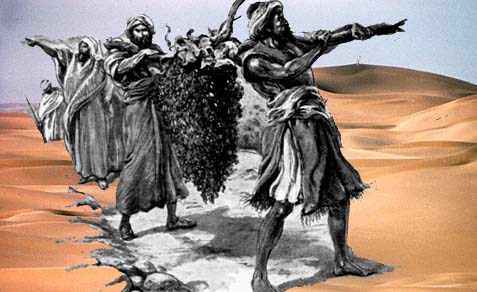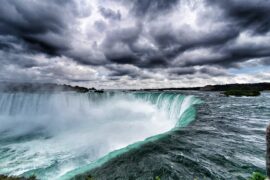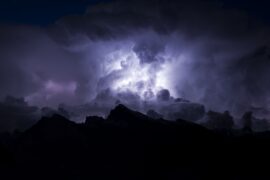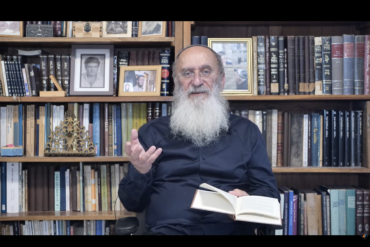“They took in their hands from the fruit of the land and brought it down to us; they brought back word to us and said, ‘Good is the land that HaShem, our G-D, gives us!’ But you did not wish to ascend, and you rebelled against the word of HaShem your G-D.” (D’varim 1:25-26)
Moshe rebukes the children of Israel, not for their sin but for that of their fathers who had already perished in the desert. This seemingly unwarranted admonition serves to create within Israel a feeling of collective responsibility and to offer the people an opportunity to correct the major shortcoming of the previous generation. In order to correct past transgressions, however, it is first necessary to internalize what had actually taken place. And in order to clearly appreciate this teaching, we must identify who the “they” are that Moshe refers to in his rebuke.
“Yehoshua son of Nun and Kalev son of Yephune, of the spies of the land, tore their garments. They spoke to the entire assembly of the children of Israel, saying, ‘The land that we passed through, to spy it out – the land is very, very good. If HaShem desires us, He will bring us to this land and give it to us, a land that flows with milk and honey. But do not rebel against HaShem! You should not fear the people of the land, for they are our bread. Their protection has departed from them; HaShem is with us. Do not fear them!’” (Bamidbar 14:6-9)
The “they” are Yehoshua and Kalev, two of the twelve tribal chiefs sent into Canaan to spy out the country and report back to Moshe. The twelve spies were the Torah giants of their generation and for reasons of pekuaḥ nefesh (preserving life), the majority argued against entering Eretz Yisrael.
It was the minority, Yehoshua and Kalev, who asserted that Israel must enter the promised land and wage a war of liberation without taking into consideration the superior military forces of the Canaanites. This being the case, the question arises how following the majority of rabbis over a seemingly irresponsible and adventurist minority opinion could be called rebelling against the word of HaShem – especially when Israel has been instructed to generally follow the legal opinions of the rabbinic majority.
To properly answer this question, it is necessary to accept that despite the great piety and scholarship of leading rabbis, legal decisions regarding national issues can often be influenced by factors like personality and transient circumstances.
The mistaken assumption in certain circles that the rulings of great rabbis are at all times stirred by Divine inspiration, which by definition must be infallible, has unfortunately led several institutions of Torah learning to promote a herd mentality that transforms many otherwise gifted students into obedient devotees – not daring to even respectfully question the opinions of leading scholars.
“If the entire assembly of Israel shall err, and a matter became obscured from the eyes of the congregation, and they commit one from among all the commandments of HaShem that may not be done, and they become guilty; when the sin regarding which they committed becomes known, the congregation shall offer a young bull as a sin-offering, and they shall bring it before the tent of meeting.” (Vayikra 4:13-14)
The Talmud explains these verses to refer to a situation in which the Sanhedrin (high court of Torah authorities) commits a mistake and, due to their error in deciding the law, a majority of Israel transgresses a commandment. The Torah is clearly recognizing the possibility of a situation in which the Sanhedrin itself can lead Israel astray.
The first Mishnah in Tractate Sanhedrin states that we are not meant to follow the majority if that majority is transgressing against the Torah. This is based on the verse in Sh’mot 23:2 which states, “Do not be a follower of the majority for evil.”
The Gaon of Vilna illuminates in Kol HaTor (the Gaon’s teachings on the process of Israel’s redemption) how even great scholars can miss the significance of events taking place in their generation.
“The Sin of the Spies… hovers over the nation of Israel in every generation… How strong is the power of the Sitra Aḥra that it succeeds in hiding from the eyes of our holy fathers the dangers of the klipot; from the eyes of Avraham our father, the klipah of exile… and in the time of the Messiah, the Sitra Aḥra attacks the guardians of Torah with blinders… Many of the sinners in this great sin of, ‘They despised the cherished land,’ and also many of the guardians of Torah, will not know or understand that they are caught in the Sin of the Spies, that they have been sucked into the Sin of the Spies in many false ideas and empty claims, and they cover their ideas with the already proven fallacy that the mitzvah of the settlement of Israel no longer applies in our day, an opinion which has already been disproven by the giants of the world, the Rishonim and Aḥronim.” (Kol HaTor chapter 5)
Rabbi Zvi Yehuda HaKohen Kook was once asked by the newspaper Maariv how Torah leaders in his day, like those in the times of Yehoshua and Kalev, could err in their opposition to the struggle for Eretz Yisrael.
He answered, “When one believes that the redemption of Israel and the coming of the Messiah must appear miraculously from out of the heavens in a way that transcends the natural order of life, then one fails to see the hand of HaShem in all of the events of the world. The redemption is not obligated to appear with obvious miracles, nor does it have to be absolutely natural. Both miracles and natural world developments belong to the Almighty’s domain. The Rambam explains that the appearance of the Messiah is also a natural historical process, which is revealed by the ingathering of the Jewish people back to the Land of Israel, and even through wars. The redemption of the Jewish people, which comes to pass in a natural way, is also from the Almighty.”
While some scholars might argue that Israel’s salvation must occur through supernatural miracles and that Jews must refrain from active participation in the national struggle, others recognize the redemption as a process that develops gradually through natural historic events in which human beings are meant to play active roles.
To only appreciate HaShem’s hand over the supernatural realm is to place limitations on His hegemony (from the perspective of man) and to not acknowledge or appreciate His guidance over the natural events of our day. Rather than reject the way in which the Kadosh Barukh Hu has chosen to bring history to fruition, Torah leaders must train the Jewish people to broaden our vision so that we might better understand our collective mission in this world, as well as the actions we must take to facilitate the redemption process already underway in these miraculous times.





